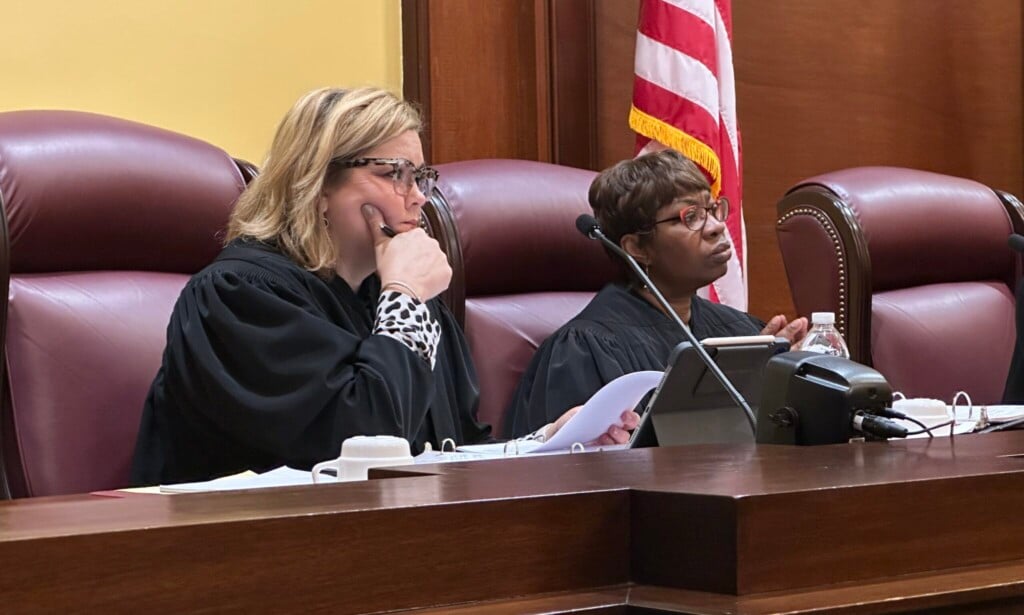KC Voices: Why I’m voting no on the “Sheriff” Amendment
We’ve been asking members of the KC community to submit stories about their thoughts and experiences in all walks of life. If you’ve got a story you’d like to share with our readers, please send it to brock@thepitchkc.com for consideration. Today, former lawyer and current KU law teacher Amii Castle weighs in on the upcoming amendment votes in Kansas.
On November 8, Kansans will vote on whether to amend our state constitution to change the rules about how we elect and remove our sheriffs.
Election of Sheriffs: The proposed amendment would require that, going forward, counties have, as their head of law enforcement, an elected sheriff. Currently, out of 105 counties in Kansas, 104 already elect their sheriffs. [Riley County consolidated its city and county government in 1974, so Riley County has no elected sheriff. This constitutional amendment would not apply to Riley County because the county already consolidated.]
So, why the need now to constitutionally require 104 counties in Kansas to continue to elect their sheriffs? Because it is important that the highest county law enforcement official answer to the electorate. If one of the 104 counties decides to consolidate its city and county law enforcement, by statute, that law enforcement agency would not have an elected sheriff. Instead, a law enforcement agency board would appoint a police director. Under this scenario, the highest city and county law enforcement official is beholden to bureaucrats—not to voters.
That means if folks in power don’t like the elected sheriff, those folks can consolidate their city and county law enforcement, create a law enforcement agency board, and appoint a police director to their liking. Personally, I prefer democracy over bureaucracy, and I want my top law enforcement official to answer to me. So, I actually agree with constitutionally mandating the election of a sheriff. It’s the power of the removal of sheriffs with which I disagree.
Removal of a Sheriff: Under current Kansas law, an elected sheriff who is behaving badly can be removed from office in one of two ways: 1) by a recall of the voters or 2) by a quo warranto proceeding. In this circumstance, a quo warranto is merely a proceeding to remove a local official from office for misconduct, willful neglect, a demonstrated mental impairment, or committing a crime
Voter Recall: The proposed constitutional amendment would not change the current rules by which a sheriff can be recalled by voters. The recall of a sheriff is initiated by a registered voter filing a petition with the county election office. So, if a citizen believes a sheriff has been up to no good, they can initiate a recall vote. The petition must have enough signatures—at least 40% of the votes cast in the last election for that office. If the petition is properly filed, an election is held, and if a majority (51%) votes to recall the sheriff, the sheriff is removed from office.
Quo Warranto: Kansas state law currently provides that a sheriff can be ousted for engaging in misconduct—misconduct such as tampering with or hiding evidence in a criminal case. Under the proposed amendment, however, district attorneys would no longer have the power to initiate a quo warranto proceeding against a sheriff—only the state’s attorney general would have that power. Why is that important?
If a county sheriff is engaging in misconduct, it will likely be the local district attorney who knows because district attorneys and sheriffs naturally work together every day. Likely, the attorney general—who sits in Topeka most days—will not know if sheriff shenanigans are even happening. This also means that a sitting attorney general can refuse to investigate a sheriff for misconduct—a sheriff the attorney generally might like—and local district attorneys will have no legal mechanism to initiate an investigation. So, if the attorney general says “no investigation into a sheriff,” there will be no investigation into that sheriff.
So, from a practical standpoint, this amendment would take power from local district attorneys to initiate a proceeding to ouster a naughty sheriff and concentrate that power in one person—the state’s attorney general.
Changing our state constitution to concentrate power in one office concerns me from a separation of powers standpoint. In addition, taking power away from locals—here local district attorneys—also troubles me. I’ll be voting no on the “sheriff” amendment.
Another proposed Constitutional amendment, another attempted power grab: After Kansas voters defeated an attempt to give the Republican-controlled legislature more power on August 2, Republican lawmakers are trying to take power again in November.
A constitutional amendment on the Nov. 8 ballot would hand the state legislature sweeping and final control over rules and regulations issued by state executive administrative agencies and give the legislature veto power over executive rules and regulations. Unfortunately, proponents of the measure have included confusing and misleading language to put forth to voters. The proposed constitutional amendment would read:
- 17. Legislative oversight of administrative rules and regulations. Whenever the legislature by law has authorized any officer or agency within the executive branch of government to adopt rules and regulations that have the force and effect of law, the legislature may provide by law for the revocation or suspension of any such rule and regulation, or any portion thereof, upon a vote of a majority of the members then elected or appointed and qualified in each house.
One stated purpose of the proposed constitutional amendment is to prohibit state executive agencies from adopting rules and regulations “without any opportunity for the legislature to revoke or suspend such rules and regulations directly.” However, lawmakers already have an “opportunity,” or a mechanism, by which to revoke or suspend state executive agency rules and regulations—the legislature can pass laws making executive rules or regulations illegal. Insinuating that the legislature has no “opportunity” to review state executive rules and regulations is disingenuous.
But as with any other law, passing a law striking down a state executive rule or regulation requires a majority of the Kansas House and Senate, a signature from the governor, or a veto-proof majority. That means currently, the legislature has the power to strike down state rules and regulations if there are enough votes to sustain a veto by the governor.
Passing the amendment would take the governor completely out of the equation and allow lawmakers to strike down agency rules and regulations—rules and regulations on which these agencies likely have more expertise than lawmakers—with a simple 51% majority vote.
And no need for a crystal ball in this scenario— a simple majority of current lawmakers would likely revoke many agency rules and regulations, including basic health safety and environmental regulations.
Passing the amendment would put an awful lot of power into the hands of 51% of our Republican-led state legislature. A “yes” vote will allow the state legislature to pass laws—by a simple majority vote—to revoke state agency rules and regulations, with no veto power from the governor. A “no” vote maintains that the legislature must pass laws, just like other laws—subject to the governor’s veto—to revoke state agency rules and regulations.






